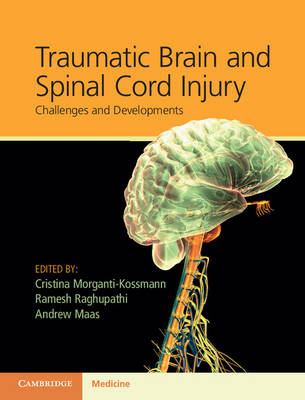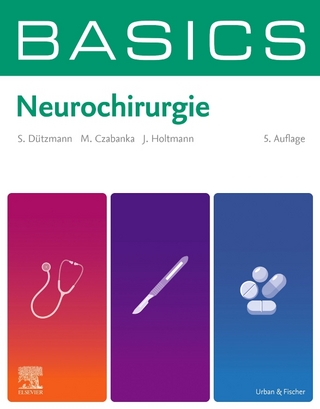
Traumatic Brain and Spinal Cord Injury
Cambridge University Press (Verlag)
978-1-107-00743-7 (ISBN)
Traumatic Brain and Spinal Cord Injury comprehensively covers the medical and pathological issues related to neurotrauma and its often devastating consequences. Written by globally renowned experts in the field, both clinicians and researchers will find this book invaluable to update their knowledge. This volume is divided into two sections, one covering the brain, the other the spinal cord. Each section discusses the following topics: • The demographic in the developed and developing world where neurotrauma is witnessing a massive expansion • Major clinical issues including advanced semi-experimental monitoring techniques utilized by neurosurgeons and intensivists and the potential use of identifying markers of tissue injury • Overview of major pathophysiological changes • The development of animal models; successes and limitations • Past, current and future therapeutic strategies including rehabilitative opportunities. Presenting the most up-to-date clinical and experimental research in neurotrauma, this volume is essential reading for neurologists, neurosurgeons, intensive care physicians and rehabilitative physicians.
Cristina Morganti-Kossmann is Associate Professor, National Trauma Research Institute, Alfred Hospital, and Department of Surgery, Monash University, Melbourne, Victoria, Australia. Ramesh Raghupathi is Associate Professor, Department of Neurobiology and Anatomy, Drexel University College of Medicine, Philadelphia, PA, USA. Andrew Maas is Professor and Chairman, Department of Neurosurgery, University Hospital Antwerp, Antwerp, Belgium.
Preface; Part I. Traumatic Brain Injury: 1. Current evaluation of TBI epidemiology in an ageing society with improved preventative measures Peter L. Reilly; 2. Neurotrauma: an emerging epidemic in low and middle income countries G. K. Prusty, G. Gururaj and K. K. Dey; 3. Blast induced traumatic brain injury and posttraumatic stress disorder Ankit I. Mehta, Gerald A. Grant and Lawrence F. Marshall; 4. Psychological effects of mild traumatic brain injury: their nature and treatment Jennie Ponsford; 5. Developments of neuroimaging techniques to diagnose and visualize white matter damage Virginia F. J. Newcombe and David K. Menon; 6. New advances in monitoring the injured brain metabolism David M. Benglis, Jr, Brett Trimble and A. Ross Bullock; 7. Potential use and limitations of microdialysis for monitoring of neurochemical changes after TBI Lars Hillered and Per Enblad; 8. Metabolic and therapeutic differences in pediatric and adult TBI: implications for clinical care and therapeutic hypothermia Michael J. Bell and Patrick M. Kochanek; 9. Utility of biomarkers for diagnosis and prognosis of traumatic brain injury Kevin K. W. Wang, Linda Papa and Ronald L. Hayes; 10. Animal models of mild and severe TBI: what have we learned in the past 30 years? Jenna M. Ziebell, Frances Corrigan and Robert Vink; 11. Pediatric brain trauma: what do age-appropriate animal models teach us about the age-at-injury? Ramesh Raghupathi and Jimmy W. Huh; 12. The complexity of traumatic axonal injury Kathryn E. Saatman; 13. Cerebral inflammation after traumatic injury: regulation of secondary damage, repair or both? Bridgette D. Semple and M. Cristina Morganti-Kossmann; 14. Controversial findings on the role of NMDA receptors in traumatic brain injury Esther Shohami and Anat Biegon; 15. Plasticity and recovery of the injured brain Dorothy A. Kozlowski and Theresa A. Jones; 16. Design and analysis of clinical trials in TBI Bob Roozenbeek and Andrew Maas; 17. Future perspectives for the treatment of traumatic brain injury patients: decompressive craniectomy, hypothermia and erythropoietin Alastair D. Nichol, Jeffrey V. Rosenfeld and D. James Cooper; Part II. Traumatic Spinal Injury: 18. Global epidemiology of traumatic spinal cord injury Julio C. Furlan and Charles H. Tator; 19. Classification and surgical stabilization of the injured spine Ricky Rasschaert and Thomas Kossmann; 20. Spinal cord injury: pathophysiology and prospect of decompressive surgical treatment Jefferson R. Wilson and Michael G. Fehlings; 21. Modeling the injured spinal cord to match the human condition Jacqueline C. Bresnahan and Michael S. Beattie; 22. Myelin inhibitors of neurite outgrowth in spinal cord injury Michael F. Azari and Steven Petratos; 23. Controversies on the role of inflammation in the injured spinal cord John C. Gensel and Phillip G. Popovich; 24. Cell transplantation for spinal cord injury Nataliya Romanyuk, Pavla Jendelová and Eva Syková; 25. Combining transplant-based and pharmacologic interventions with behavioral training and exercise for recovery from chronic spinal cord injury Marion Murray, Laura Krisa and John Houle; 26. Chances and limits of locomotor training after damage to the central nervous system Volker Dietz; 27. Temperature management and therapeutic hypothermia for the treatment of spinal cord injury W. Dalton Dietrich; 28. Spinal cord injury clinical trials 1990–2010 Wise Young; Index.
| Erscheint lt. Verlag | 19.7.2012 |
|---|---|
| Zusatzinfo | 13 Plates, color; 23 Halftones, black and white; 28 Line drawings, black and white |
| Verlagsort | Cambridge |
| Sprache | englisch |
| Maße | 192 x 252 mm |
| Gewicht | 930 g |
| Themenwelt | Medizinische Fachgebiete ► Chirurgie ► Neurochirurgie |
| Medizin / Pharmazie ► Medizinische Fachgebiete ► Neurologie | |
| ISBN-10 | 1-107-00743-7 / 1107007437 |
| ISBN-13 | 978-1-107-00743-7 / 9781107007437 |
| Zustand | Neuware |
| Informationen gemäß Produktsicherheitsverordnung (GPSR) | |
| Haben Sie eine Frage zum Produkt? |
aus dem Bereich


